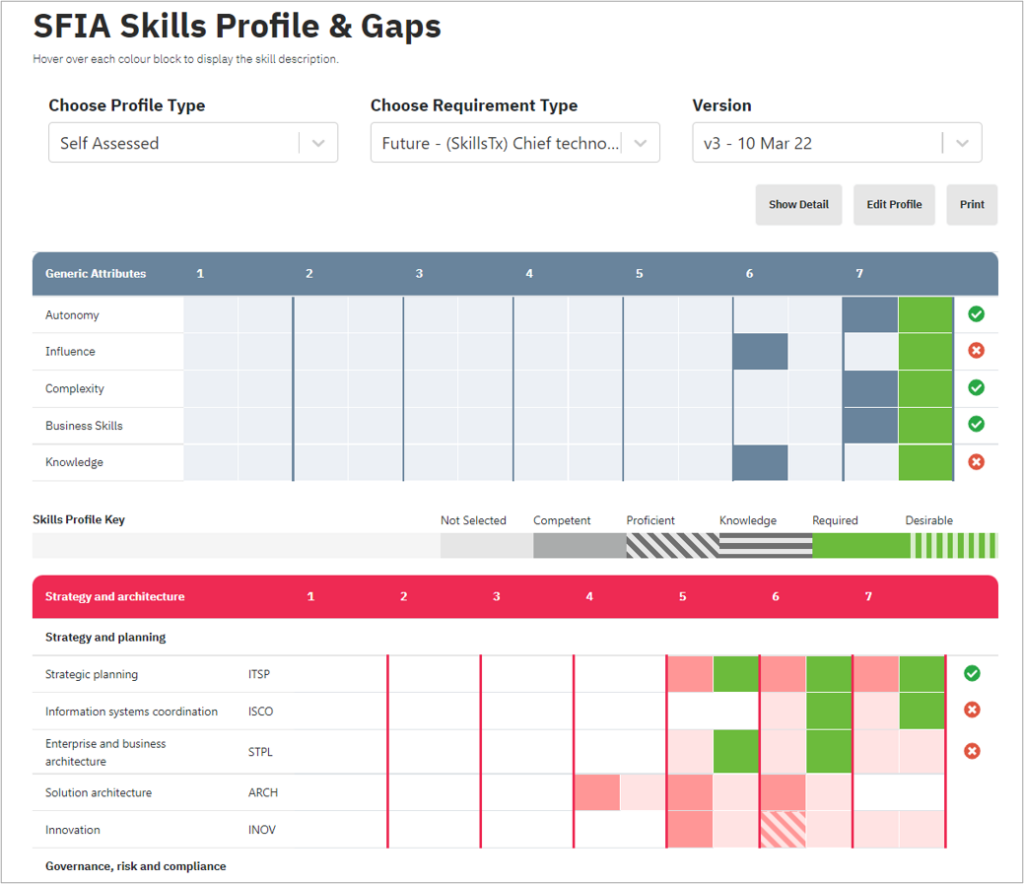Reports differ! Some talk about skills shortages and struggling to find people to fill vacancies. Others are talking about needing to reduce costs and let people go.
These things often appear to be cyclical, and there can be regional variances with one country desperately trying to find more skilled resources while in others redundancy and unemployment are growing.
Regardless of the situation, accurate and complete skills and competencies data is essential – both to support decision-making by the organization or government, and to support the individuals who may be looking for work or continuing to progress their career development. Let’s explore a few scenarios:
We have vacancies we need to fill
Look for internal candidates
If you have a complete and accurate inventory of the skills of your people, and I mean ‘complete’ (not just the subset of skills they use in their current jobs, but all their skills and competencies based on their unique experience), you will avoid missing potential internal candidates. People are so much more than their current job description, and employers who fail to realize this are the ones that risk losing people because they feel undervalued or passed-over for vacancies and promotions purely because their employer didn’t realize they were a close-enough match (see HasBean – A day in the life #33). Remember that with internal candidates you may very well wish to accept a slightly lower level of match in order to provide a development opportunity. SFIA-based skill profiles can help you make a more objective decision based on skills and competencies rather than risk any other bias (see HasBean – A day in the life #5)
Remember that technologies are not skills! If your skills inventory says “Oracle”, that is not a skill – you need to know what they do with Oracle to identify their skill. For example, do they act as a Database Administrator (probably the Database administration DBAD skill in SFIA), or do they design the databases (Database design DBDS), or do they support an Oracle application (Application support ASUP) or have they been a Project Manager for an Oracle implementation project (Project management PRMG)? See HasBean – A day in the life #31
Also, a list of training certificates will tell you about theoretical knowledge, but not about proficient skills and fully developed professional competencies. See HasBean – A day in the life #8
Start recruitment process
If no suitable internal candidates are available, it might be time to look outside. The key to attracting suitable candidates is to be accurate in describing what you need – and this is where a well-structured SFIA-based job/position description is essential. Many job descriptions end up being too generic, sometimes due to constraints around the job grading processes or the capabilities of the generalist HR platform (see HasBean – A day in the life #35). SFIA helps you to clearly state what the person will be doing – it needs to be up-to-date (see HasBean – A day in the life #42 – SkillsTX | Passion for Potential), accurate and specific (see HasBean – A day in the life #18).
We have to let some people go
How do you make the difficult decisions?
An accurate skills inventory will tell you exactly what skills and competencies you have now. Without this, how can you make the difficult decision around which skills you have to keep within the organization and which you can afford to see walking out the door? Many organizations use a skills framework as an objective and fair way of making the difficult decisions around who stays, and SFIA-based assessment as a fair and transparent process.
Are there suitable alternative roles internally?
In situations where jobs become redundant, having a skills profile which lists all the skills of the individual (not just the subset in their current job) allows you to consider if there are any other roles / vacancies in your organization that they could move in to.
Boost their chances of finding their next job
In the worst case, where you have to let them go, their up-to-date and accurate skills profile acts as a Digital CV or Resume, and gives them a much better chance of securing a suitable job elsewhere. Assessment (self-assessment, with manager approval and sometimes even SFIA Assessor certification) can also be great outplacement actions helping them get a new job (whether it’s in your organization or elsewhere). Imagine finding yourself looking for work because your previous employer has had to let you go, but knowing they used a fair and objective process to make the difficult decision, did their best to keep you by fully understanding all of your skills and competencies and looking for internal vacancies that might suit, and provided you with a Digital CV / Resume which is approved by your manager as being accurate, and potentially even with Digital Badges / Credentials from the SFIA Assessment Scheme that act as independently verified certification of your professional competencies.
How well prepared are you?
Find out how well prepared your organization is by spending 15-minutes completing our FREE Digital Skills Management (DSM) Maturity assessment, and receive a tailored report full of guidance and options aligned to your targets and preferences.






